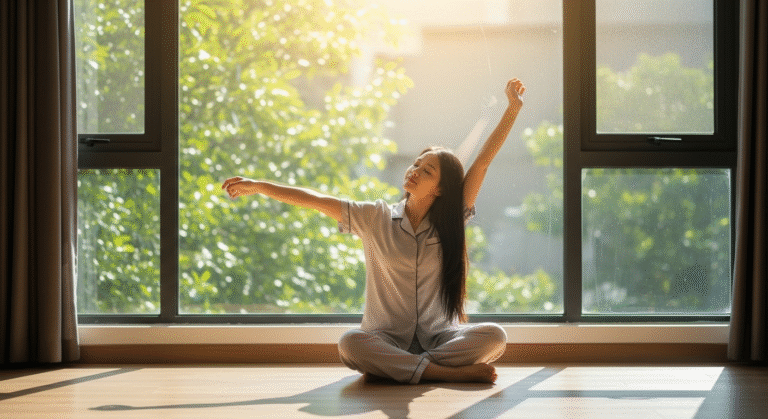Meta Description: Transform your nights with holistic bedtime routines that promote better sleep and overall wellness. Discover natural self-care practices for restorative rest.
I used to be one of those people who’d crash into bed around midnight, scroll through my phone for “just five minutes” (which inevitably turned into forty), then wonder why I’d wake up feeling like I’d been hit by a truck. Sound familiar?
It wasn’t until I started treating sleep as the ultimate form of self-care that everything changed. We spend so much energy optimizing our morning routines, meal prep, and workout schedules, but somehow bedtime gets the leftover scraps of our attention. Here’s the thing though – creating a holistic bedtime routine isn’t just about getting more sleep. It’s about setting yourself up for better mental clarity, improved immune function, and that glowing skin we’re all chasing.
Let’s dive into how you can transform your evenings into a sanctuary of restoration and wellness.
The Science Behind Sleep as Self-Care
Your body doesn’t just “turn off” when you sleep – it shifts into repair mode. During those precious 7-9 hours, your brain clears toxins, your muscles rebuild, and your immune system strengthens. Research from the National Sleep Foundation shows that people with consistent bedtime routines fall asleep 37% faster than those without one.
But here’s what really got my attention: a 2024 study published in the Journal of Health Psychology found that people who viewed their bedtime routine as self-care rather than just “getting ready for bed” reported 23% better sleep quality and significantly lower stress levels.
The difference? Intention. When you approach your evening ritual with mindfulness and purpose, you’re not just preparing for sleep – you’re actively investing in your wellbeing.
Creating Your Digital Sunset
One of the biggest game-changers in my bedtime routine was implementing what I call a “digital sunset.” About an hour before I want to fall asleep, all screens go into night mode or get put away entirely.
The blue light from our devices tricks our brains into thinking it’s still daytime, suppressing melatonin production. But beyond the science, there’s something deeply peaceful about giving your mind permission to slow down without the constant ping of notifications.
I’ve been loving the Himalayan Salt Lamp from Amazon for creating that warm, amber glow in my bedroom during this wind-down time. It’s not just Instagram-worthy (though it definitely is) – the soft light helps signal to your body that it’s time to start producing those sleepy hormones naturally.

The Power of Scent and Atmosphere
Your bedroom should feel like a completely different world from the rest of your house – a place where stress literally can’t follow you. I learned this the hard way after months of treating my bedroom like a second office.
Essential oils have become non-negotiable in my routine. Lavender gets all the attention (and for good reason), but don’t sleep on chamomile, bergamot, or even eucalyptus if you’re dealing with seasonal congestion. I use a simple ultrasonic diffuser that runs for about 30 minutes before automatically shutting off.
Temperature matters more than most people realize. Your core body temperature naturally drops as you prepare for sleep, so keeping your bedroom between 65-68°F actually works with your biology, not against it. If you’re always running hot like me, investing in breathable bedding made from bamboo or linen can make a massive difference.

Mindful Movement and Gentle Stretching
This might sound counterintuitive, but gentle movement before bed can actually help you sleep better. I’m not talking about a full workout – save that for earlier in the day. Instead, think restorative yoga poses, light stretching, or even just some intentional breathing.
My go-to sequence includes child’s pose, gentle spinal twists, and legs-up-the-wall pose. These movements help release physical tension while signaling to your nervous system that it’s time to shift from “go mode” to “rest mode.” The key is keeping everything slow and mindful – no rush, no goals except feeling more relaxed than when you started.
For anyone dealing with tight hips or lower back tension (hello, desk job life), I can’t recommend the Gaiam Restorative Yoga Bolster enough. It’s been a game-changer for making those gentle stretches more comfortable and sustainable. Plus, it doubles as extra back support when I’m reading in bed.

Nourishing Your Body for Better Sleep
What you eat and drink in the hours before bed can make or break your sleep quality. I used to think a glass of wine would help me relax, but it actually fragments your sleep cycles later in the night. Same goes for that late-night coffee run or heavy meal that seemed like a good idea at the time.
Instead, I’ve started incorporating sleep-supporting foods into my evening routine. A small handful of almonds or walnuts provides magnesium and healthy fats. Chamomile tea has become my evening ritual – there’s something almost ceremonial about brewing a cup and sipping it slowly while reading or journaling.
If you’re someone who gets genuinely hungry before bed (not just bored-snacking), try something light with tryptophan like a small piece of turkey, a banana with a tiny bit of almond butter, or even a few tart cherries, which naturally contain melatonin.
Hydration is important, but timing matters. I try to get most of my water intake done by 7 PM to avoid those middle-of-the-night bathroom trips that completely disrupt deep sleep phases.

The Art of Mental Wind-Down
Perhaps the most overlooked aspect of bedtime routines is giving your mind permission to stop processing the day. Our brains aren’t light switches – they need transition time between “active problem-solving mode” and “rest and restore mode.”
Journaling has been my secret weapon here. Not the deep, analytical kind of writing, but simple brain dumps. What went well today? What am I grateful for? What’s on my mind for tomorrow? Getting those swirling thoughts out of my head and onto paper creates space for actual rest.
Reading fiction (emphasis on fiction) is another powerful way to shift your mental state. When you’re following a story, your brain moves away from problem-solving and into imagination mode, which is much closer to the state you need for sleep.
Some nights, I’ll do a quick meditation using the Insight Timer app, but honestly, sometimes it’s just five minutes of deep breathing while focusing on releasing tension from my shoulders, jaw, and forehead – places where I hold stress without even realizing it.
Building Your Personal Sleep Sanctuary
The most effective bedtime routine is one that feels genuinely good to you, not one that looks perfect on social media. Start with one or two elements that resonate with you, then gradually add others as they become natural habits.
Maybe you’re drawn to the aromatherapy aspect, or perhaps the gentle movement feels most appealing. There’s no wrong place to start – the key is consistency and approaching each element with intention rather than checking boxes.
Your bedroom itself plays a huge role too. Investing in blackout curtains, comfortable pillows that actually support your sleep position, and bedding that feels good against your skin isn’t vanity – it’s health maintenance. I recently upgraded to the Coop Home Goods Eden Pillow, and the difference in neck support has been incredible. It’s adjustable, so you can add or remove filling based on your sleep position preferences.

Making It Sustainable
The biggest mistake I see people make with bedtime routines is trying to do everything at once, then burning out after a week. Start small. Pick two or three elements that feel manageable and enjoyable, then build from there.
Remember, this is self-care, not another item on your to-do list. Some nights your routine might be 45 minutes of luxurious wind-down time. Other nights, it might just be five minutes of deep breathing and gratitude. Both are valid, and both are infinitely better than scrolling through your phone until your eyes hurt.
The goal isn’t perfection – it’s creating a consistent signal to your body and mind that rest is not only allowed but prioritized. In our always-on culture, that’s actually pretty revolutionary.
Try incorporating one new element into your bedtime routine this week. Your future well-rested self will thank you, and you might just discover that better sleep really is the foundation for everything else feeling easier and more joyful.
Ready to transform your evenings? Share your favorite bedtime ritual in the comments below, or tag us on social media with your sleep sanctuary setup. Sweet dreams!




